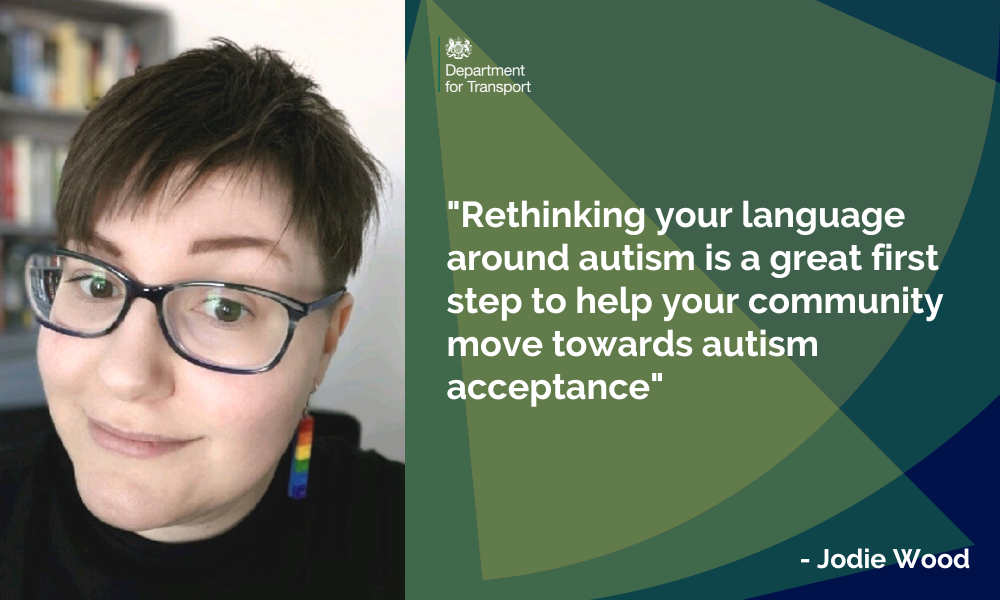Each year, National Inclusion Week gives us a chance to reflect on our workplace practices, re-thinking the language we use to be as inclusive as possible to all employees at DfT. This year, we’re taking the opportunity to discuss autism at work, encouraging employees and colleagues to embrace the week as a celebration of internal differences in their truest sense.
An important first step for us at the Department for Transport is to recognise that not only do we all think differently, but our differences help us to work better as a team. Investing time into safe spaces to have helpful discussions and share experiences that affect underrepresented employees is key.
Jodie Wood is an advocate, supporter and Diversity and Inclusion Advisor at DfT. In this article, Jodie introduces those who are unfamiliar with the concept of neurodiversity to a new way of seeing neurological differences. The blog explores neurodiversity and the creative expressions of autistic people, debunking several myths often associated with autism for people in the workplace. She hopes to bridge the gap between allies and autistics while combating the pseudoscience that threatens an inclusive environment for all employees.
DfT’s Diversity and Inclusion Strategy
Find out more about how we champion diversity and inclusion in the Department for Transport
The misused terms that cause barriers for colleagues with autism at work: Jodie’s take
As an autistic person working in diversity and inclusion, I spend a lot of time thinking about how the language we use impacts people. Rethinking our language around autism is a great first step to helping our communities move towards autism acceptance.
It can be difficult to tell someone you’re autistic, especially in the workplace. Many choose not to share their diagnosis, because of the negative stigma and potential career impact. Being autistic can be a challenge at times because the world was designed with barriers that impact how we navigate it.
Autism acceptance, therefore, goes further than being aware – it’s about understanding those barriers, and how to play your part in addressing them. Even a small change like thinking about the language you use can be a great starting point.
With that in mind, here are three responses that aren’t always helpful to say if a colleague tells you they’re autistic.

1) “I think everyone’s a little bit autistic” or “on the spectrum”
When people say this, they usually mean that they’ve recognised some traits of autism in their behaviour. But that’s because autistic behaviour is human behaviour.
Autism isn’t something you can have a ‘little bit of’ like autistic sprinkles on a non-autistic cupcake! When I hear this, to me it sounds like “everyone struggles with that” – which undermines the challenges some autistics face.
2) “You must be high functioning” or, “you don’t look autistic!”
There is a misconception that the autism spectrum is a straight line from “not very autistic” to “very autistic”. This isn’t accurate, and for some of us, how we “function” isn’t static through life, or even across the course of a day.

Sometimes I need to wear noise-cancelling headphones or flap my hands to calm down – at other times, my diagnosis might be invisible if you don’t know me. But you can’t tell how I function by interacting with me briefly, because I change my behaviour to fit in – something called ‘masking’.
As for “not looking autistic” – what is an autistic person supposed to look like, anyway?
Many people in the autism community have moved away from the terms high-functioning and low-functioning which have some stigma attached. Instead, we talk about people’s support needs – because like people who aren’t autistic, we have different needs at different times.
3) “You’re not like my autistic relative”
People who learn my diagnosis are sometimes confused because I’m not like their eight-year-old autistic relative who loves Lego. This is because we rarely see or hear about autism from past childhood.
When someone says this, I often answer, “Well, yeah, I’m a 30-year-old woman!”
Being autistic is one facet of my being – that might be one of the only things I have in common with your relative. Though, to be fair, I do quite like Lego.
What’s the best thing to say or do instead?
“Thanks for telling me that – is there anything I can do to support you?”
A person who has shared that they are autistic is usually trusting you for a reason. They may be hoping you can point them to DfT’s Staff Networks like the Neurodiversity Network or the Ability Network. Perhaps they’re looking for support in accessing workplace adjustments, or they may just be seeking understanding and acceptance.

Being autistic can be a challenge at times because the world was designed with barriers that impact how we navigate it.
Autism acceptance, therefore, goes further than being aware – it’s about understanding those barriers, and how to play your part in addressing them. Even a small change like thinking about the language you use can be a great first step.
Moving towards a better future
At the Department for Transport, we believe in creating a work environment where everyone feels valued – where there are no barriers to successful careers or positive workplace experiences. Join us, and together, we’ll play a vital role in supporting the transport network that allows the UK’s people and businesses to thrive.




